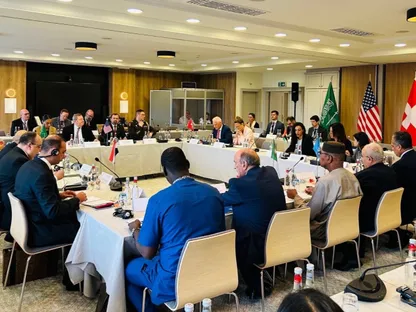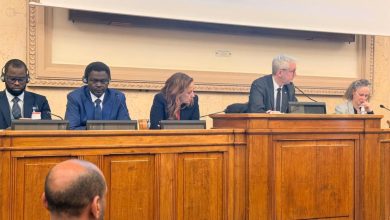Reports
Sudan at War: The Art of Peace Talks and Why They Often Fail

Philip Kastner
High-level peace talks were held in August 2024 to negotiate a crucial ceasefire in Sudan. Unfortunately, nothing concrete emerged from the talks held in Switzerland and hosted by the United States and Saudi Arabia.
Previous efforts were made to bring the main warring parties in Sudan—the Sudanese Armed Forces (SAF) and the Rapid Support Forces (RSF)—to the negotiation table and stop the war. Significant efforts in Jeddah, Saudi Arabia, led to a short-term ceasefire a month after the conflict began in April 2023, but there have been no further noteworthy successes.
Meanwhile, the fighting continues. Eleven million people out of a population of around fifty million have been displaced. Half of the population suffers from acute hunger. Philip Kastner, a researcher in international law and peace, who has analyzed several peace negotiations and agreements, explains the obstacles facing Sudan on its path to a peace agreement.
Why Do Peace Talks Fail?
Negotiating peace is an extremely complex process, and there are many reasons why talks often fail.
First, conflicting parties sometimes don’t come to the negotiating table because they’re not convinced they will benefit from the talks. This was the case with the peace talks in Switzerland regarding Sudan. While the RSF sent a delegation, the SAF, the other main party in the conflict, did not.
Second, external support for negotiations and pressure on the parties to resolve their conflict peacefully is often insufficient. In the case of Sudan, key international players, including the United States, the United Nations, and several regional powers, officially supported the recent talks. However, the reality is that many of these actors are pursuing conflicting interests. Saudi Arabia and the United Arab Emirates, in particular, see this war as an opportunity to increase their influence.
Given their significant leverage over the SAF and RSF, these powers could and should be more actively involved in mediating between the warring parties. This would send a message to the international community that Sudan’s suffering is being taken seriously. In fact, the current humanitarian catastrophe should be a red line. At the very least, all military support to the warring parties must stop.
Moreover, the expertise of specialized non-governmental organizations (NGOs) without geopolitical interests has not been sufficiently utilized. Such organizations have helped mediate conflicts around the world, including in Mozambique, Ethiopia, and Indonesia’s Aceh region. This neutral expertise is essential in managing complex situations like the one in Sudan.
What Needs to Happen in Sudan?
Negotiating peace is not a matter of following a simple recipe. It is rarely a linear process that moves through clearly defined stages.
For example, contrary to common assumptions, a ceasefire doesn’t necessarily have to be the first step. In fact, many peace negotiations—from Bosnia and Herzegovina to Colombia—were conducted while fighting continued and resulted in substantive agreements.
It’s also important to understand that focusing solely on high-level talks is not enough. Peace must also be built on the ground. Civil society, including women, cannot be marginalized. In Sudan, divisions are increasing, and neither the SAF nor the RSF have central control over their broad alliances.
Local agreements can significantly increase the safety of people in specific areas. These agreements can also offer some fighters an opportunity to disarm and return to civilian life, contributing to sustainable peacebuilding.
Instead, ethnic tensions have been exploited and exacerbated by the ethnic recruitment of fighters. Moreover, allegations of war crimes and crimes against humanity, including indiscriminate killings and rape, bring to mind the genocide in Darfur 20 years ago.
This suffering, coupled with the complexity of the conflict, means that the international community cannot wait for the “right moment” when the warring parties agree that negotiating is better than fighting. It’s a common mistake to hope for such ideal conditions for negotiations.
Instead, those with influence over the parties must constantly seek entry points for negotiations and create opportunities for peace. Every small gain is a success.
The warring parties must agree to halt hostilities and open humanitarian corridors to allow relief organizations to do their work and save lives. Instead, they have chosen to continue the war and obstruct humanitarian access, with catastrophic consequences.
What Other Obstacles Are in the Way?
The factors fueling the conflict must also be addressed. One of the obstacles to peace in Sudan is that both the SAF and RSF have substantial financial resources, particularly from the gold trade. This enables them to sustain the war. Therefore, international sanctions will be necessary to cut off this source of revenue.
Second, the current United Nations arms embargo on Sudan is too limited and poorly enforced. The availability of weapons and military equipment in the region reflects a problem in the international system, which prioritizes the profits of arms manufacturers and dealers over the security and lives of people.
The international community can, and should, do more to address the militarization of entire societies and promote peaceful ways to resolve conflicts.
In other words, peacebuilding requires work on multiple levels. Although we can learn from past successes and failures, it is essential to think creatively about peace. This may be daunting and time-consuming, but it can lead to more sustainable peace. Those affected by war and its terrible consequences, in Sudan and elsewhere, need this commitment.
Senior Lecturer in International Law at the University of Western Australia.



